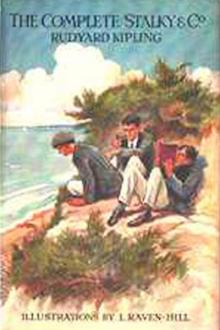Stalky & Co. - Rudyard Kipling (ebooks children's books free TXT) 📗

- Author: Rudyard Kipling
- Performer: -
Book online «Stalky & Co. - Rudyard Kipling (ebooks children's books free TXT) 📗». Author Rudyard Kipling
But there were no words. Sefton gazed at the lop-sided wreck in horror and despair. Two fat tears rolled down his cheek.
“Oh, I forgot! I say, Sefton, what did you bully Clewer for?”
“Leave me alone! Oh, you infernal bullies, leave me alone! Haven’t I had enough?”
“He says we must leave him alone,” said McTurk.
“He says we are bullies, an’ we haven’t even begun yet,” said Beetle. “You’re ungrateful, Seffy. Golly! You do look an atrocity and a half!”
“He says he has had enough,” said Stalky. “He errs!”
“Well, to work, to work!” chanted McTurk, waving a stump. “Come on, my giddy Narcissus. Don’t fall in love with your own reflection!”
“Oh, let him off,” said Campbell from his corner; “he’s blubbing, too.”
Sefton cried like a twelve-year-old with pain, shame, wounded vanity, and utter helplessness.
“You’ll make it pax, Sefton, won’t you? You can’t stand up to those young devils—”
“Don’t be rude, Campbell, de-ah,” said McTurk, “or you’ll catch it again!”
“You are devils, you know,” said Campbell.
“What? for a little bullyin’—same as you’ve been givin’ Clewer! How long have you been jestin’ with him?” said Stalky. “All this term?”
“We didn’t always knock him about, though!”
“You did when you could catch him,” said Beetle, cross-legged on the floor, dropping a stump from time to time across Sefton’s instep. “Don’t I know it!”
“I—perhaps we did.”
“And you went out of your way to catch him? Don’t I know it! Because he was an awful little beast, eh? Don’t I know it! Now, you see, you‘re awful beasts, and you’re gettin’ what he got—for bein’ a beast. Just because we choose.”
“We never really bullied him—like you’ve done us.”
“Yah!” said Beetle. “They never really bully—‘Molly’ Fairburn didn’t. Only knock ‘em about a little bit. That’s what they say. Only kick their souls out of ‘em, and they go and blub in the box-rooms. Shove their heads into the ulsters an’ blub. Write home three times a day—yes, you brute, I’ve done that—askin’ to be taken away. You’ve never been bullied properly, Campbell I’m sorry you made pax.”
“I’m not!” said Campbell, who was a humorist in a way. “Look out, you’re slaying Sefton!”
In his excitement Beetle had used the stump unreflectingly, and Sefton was now shouting for mercy.
“An’ you!” he cried, wheeling where he sat. “You’ve never been bullied, either. Where were you before you came here?”
“I—I had a tutor.”
“Yah! You would. You never blubbed in your life. But you’re blubbin’ now, by gum. Aren’t you blubbin’?”
“Can’t you see, you blind beast?” Sefton fell over sideways, tear-tracks furrowing the dried lather. Crack came the cricket-stump on the curved latter-end of him.
“Blind, am I,” said Beetle, “and a beast? Shut up, Stalky. I’m goin’ to jape a bit with our friend, _a’la ‘Molly’ Fairburn. I think I can see. Can’t I see, Sefton?”
“The point is well taken,” said McTurk, watching the strap at work. “You’d better say that he sees, Seffy.”
“You do—you can! I swear you do!” yelled Sefton, for strong arguments were coercing him.
“Aren’t my eyes lovely?” The stump rose and fell steadily throughout this catechism.
“Yes.”
“A gentle hazel, aren’t they?”
“Yes—oh, yes!”
“What a liar you are! They’re sky-blue. Ain’t they sky-blue?”
“Yes—oh, yes!”
“You don’t know your mind from one minute to another. You must learn—you must learn.”
“What a bait you’re in!” said Stalky. “Keep your hair on, Beetle.”
“I’ve had it done to me,” said Beetle. “Now—about my being a beast.”
“Pax—oh, pax!” cried Sefton; “make it pax. I’ll give up! Let me off! I’m broke! I can’t stand it!”
“Ugh! Just when we were gettin’ our hand in!” grunted McTurk.
“They didn’t let Clewer off, I’ll swear.”
“Confess—apologize—quick!” said Stalky.
From the floor Sefton made unconditional surrender, more abjectly even than Campbell He would never touch any one again. He would go softly all the days of his life.
“We’ve got to take it, I suppose?” said Stalky. “All right, Sefton. You’re broke? Very good. Shut up, Beetle! But before we let you up, you an’ Campbell will kindly oblige us with ‘Kitty of Coleraine’—_a’la Clewer.”
“That’s not fair,” said Campbell; “we’ve surrendered.”
“‘Course you have. Now you’re goin’ to do what we tell you—same as Clewer would. If you hadn’t surrendered you’d ha’ been really bullied. Havin’ surrendered—do you follow, Seffy?—you sing odes in honor of the conquerors. Hurry up!”
They dropped into chairs luxuriously. Campbell and Sefton looked at each other, and, neither taking comfort from that view, struck up “Kitty of Coleraine.”
“Vile bad,” said Stalky, as the miserable wailing ended. “If you hadn’t surrendered it would have been our painful duty to buzz books at you for singin’ out o’ tune. Now then.”
He freed them from their bonds, but for several minutes they could not rise. Campbell was first on his feet, smiling uneasily. Sefton staggered to the table, buried his head in his arms, and shook with sobs. There was no shadow of fight in either—only amazement, distress, and shame.
“Ca—can’t he shave clean before tea, please?” said Campbell. “It’s ten minutes to bell.”
Stalky shook his head. He meant to escort the half-shaved one to the meal.
McTurk yawned in his chair and Beetle mopped his face. They were all dripping with excitement and exertion.
“If I knew anything about it, I swear I’d give you a moral lecture,” said Stalky severely.
“Don’t jaw; they’ve surrendered,” said McTurk. “This moral suasion biznai takes it out of a chap.”
“Don’t you see how gentle we’ve been? We might have called Clewer in to look at you,” said Stalky. “‘The bleatin’ of the tiger excites the kid.’ But we didn’t. We’ve only got to tell a few chaps in Coll. about this and you’d be hooted all over the shop. Your life wouldn’t be worth havin’. But we aren’t goin’ to do that, either. We’re strictly moral suasers, Campbell; so, unless you or Seffy split about this, no one will.”
“I swear you’re a brick,” said Campbell. “I suppose I was rather a brute to Clewer.”
“It looked like it,” said Stalky. “But I don’t think Seffy need come into hall with cock-eye whiskers. Horrid bad for the fags if they saw him. He can shave. Ain’t you grateful, Sefton?”
The head did not lift. Sefton was deeply asleep.
“That’s rummy,” said McTurk, as a snore mixed with a sob. “‘Cheek, I think; or else he’s shammin’.”
“No, ‘tisn’t,” said Beetle. “‘When ‘Molly’ Fairburn had attended to me for an hour or so I used to go bung off to sleep on a form sometimes. Poor devil! But he called me a beastly poet, though.”
“Well, come on.” Stalky lowered his voice. “Good-by, Campbell. ‘Member, if you don’t talk, nobody will.”
There should have been a wardance, but that all three were so utterly tired that they almost went to sleep above the tea-cups in their study, and slept till prep.
“A most extraordinary letter. Are all parents incurably mad? What do you make of it?” said the Head, handing a closely written eight pages to the Reverend John.
“‘The only son of his mother, and she a widow.’ That is the least reasonable sort.” The chaplain read with pursed lips. “If half those charges are true he should be in the sick-house; whereas he is disgustingly well. Certainly he has shaved. I noticed that.”
“Under compulsion, as his mother points out. How delicious! How salutary!”
“You haven’t to answer her. It isn’t often I don’t know what has happened in the school; but this is beyond me.”
“If you asked me I should say seek not to propitiate. When one is forced to take crammers’ pups—”
“He was perfectly well at extra-tuition—with me—this morning,” said the Head, absently. “Unusually well behaved, too.”
“—they either educate the school, or the school, as in this case, educates them. I prefer our own methods,” the chaplain concluded.
“You think it was that?” A lift of the Head’s eyebrow.
“I’m sure of it! And nothing excuses his trying to give the College a bad name.”
“That’s the line I mean to take with him,” the Head answered.
The Augurs winked.
A few days later the Reverend John called on Number Five. “Why haven’t we seen you before, Padre?” said they.
“I’ve been watching times and seasons and events and men—and boys,” he replied. “I am pleased with my Tenth Legion. I make them my compliments. Clewer was throwing ink-balls in form this morning, instead of doing his work. He is now doing fifty lines for—unheard-of audacity.”
“You can’t blame us, sir,” said Beetle. “You told us to remove the—er—pressure. That’s the worst of a fag.”
“I’ve known boys five years his senior throw ink-balls, Beetle. To such an one have I given two hundred lines—not so long ago. And now I come to think of it, were those lines ever shown up?”
“Were they, Turkey?’ said Beetle unblushingly.
“Don’t you think Clewer looks a little cleaner, Padre?” Stalky interrupted.
“We’re no end of moral reformers,” said McTurk.
“It was all Stalky, but it was a lark,” said Beetle.
“I have noticed the moral reform in several quarters. Didn’t I tell you you had more influence than any boys in the Coll. if you cared to use it?”
“It’s a trifle exhaustin’ to use frequent—our kind of moral suasion. Besides, you see, it only makes Clewer cheeky.”
“I wasn’t thinking of Clewer; I was thinking of—the other people, Stalky.”
“Oh, we didn’t bother much about the other people,” said McTurk. “Did we?”
“But I did—from the beginning.”
“Then you knew, sir?”
A downward puff of smoke. “Boys educate each other, they say, more than we can or dare. If I had used one half of the moral suasion you may or may not have employed—”
“With the best motives in the world. Don’t forget our pious motives, Padre,” said McTurk.
“I suppose I should be now languishing in Bideford jail, shouldn’t I? Well, to quote the Head, in a little business which we have agreed to forget, that strikes me as flagrant injustice … What are you laughing at, you young sinners? Isn’t it true? I will not stay to be shouted at. What I looked into this den of iniquity for was to find out if any one cared to come down for a bathe off the Ridge. But I see you won’t.”
“Won’t we, though! Half a shake, Padre Sahib, till we get our towels, and noussommes_avec_vous_!”
A LITTLE PREP.
Easter term was but a month old when Stettson major, a dayboy, contracted diphtheria, and the Head was very angry. He decreed a new and narrower set of bounds—the infection had been traced to an outlying farmhouse—urged the prefects severely to lick all trespassers, and promised extra attentions from his own hand. There were no words bad enough for Stettson major, quarantined at his mother’s house, who had lowered the school-average of health. This he said in the gymnasium after prayers. Then he wrote some two hundred letters to as many anxious parents and guardians, and bade the school carry on. The trouble did not spread, but, one night, a dog-cart drove to the Head’s door, and in the morning the Head had gone, leaving all things in charge of Mr. King, senior housemaster. The Head often ran up to town, where the school devoutly believed he bribed officials for early proofs of the Army Examination papers; but this absence was unusually prolonged.
“Downy old bird!” said Stalky to the allies one wet afternoon in the study. “He must have gone on a bend and been locked up under





Comments (0)